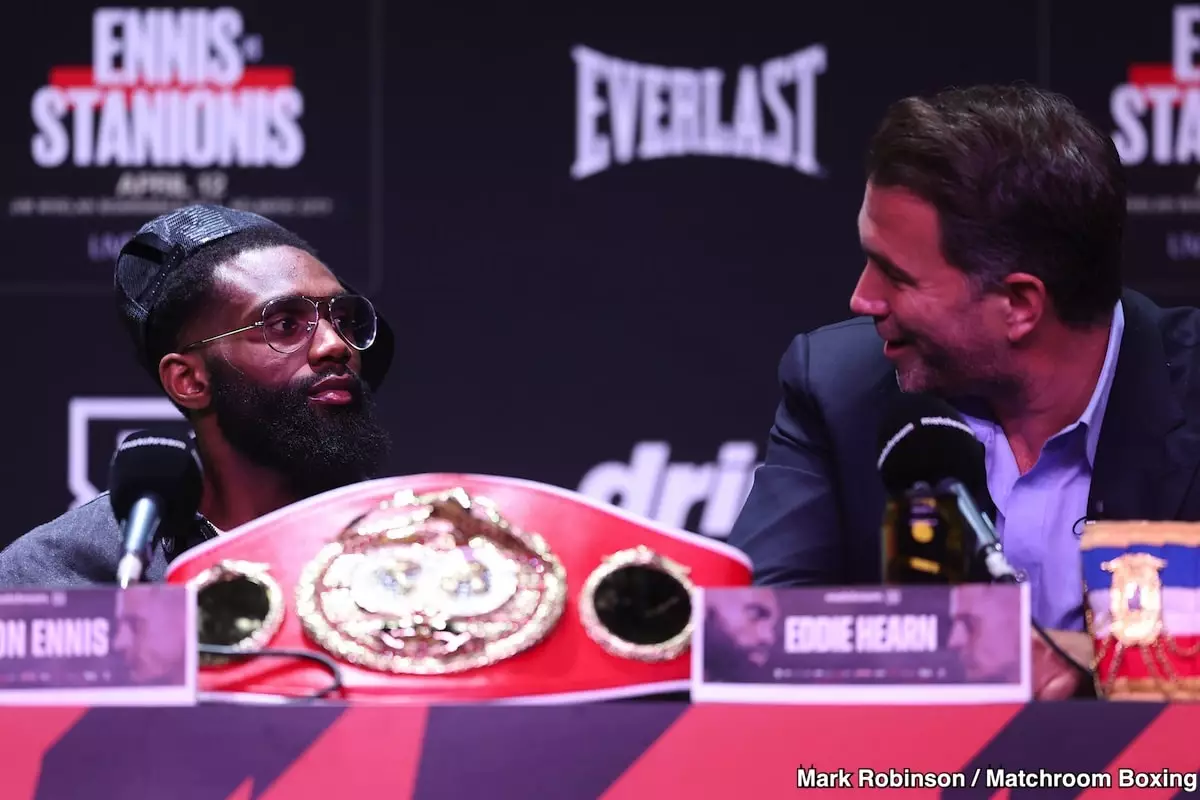In the realm of boxing, the decisions made outside the ring can sometimes overshadow the performances within it. This reality hit Jaron ‘Boots’ Ennis hard when he opted to decline a bout against the formidable Vergil Ortiz Jr. Known for his impressive record of 33 wins with 29 KOs, Ennis had previously called out elite fighters like Terence Crawford. However, his choice to turn down what was rumored to be a lucrative career-high payday for a fight with Ortiz has raised eyebrows and disappointed many in the boxing community. Commentator Sergio Mora articulated this sentiment clearly, emphasizing that Ennis’s refusal was a “bad look.” The optics of athletes turning down opportunities, especially those promising significant financial reward alongside a chance for glory, can depict them as lacking ambition or courage.
The Price of Pride
Ennis’s decision cannot merely be viewed through the lens of finances; it taps into the deeper issues of pride and self-belief on the part of athletes. Having recently suffered a shaky performance against Karen Chukhadzhian, it’s plausible that Ennis’s confidence was shaken, leading him to think twice about stepping into the ring with Ortiz. After all, facing a boxer like Ortiz, who himself possesses a relentless fighting spirit, represented a leap into danger that may have felt overwhelming so soon after a lackluster outing. While prioritizing one’s mental state is crucial in sports, refusing a financial opportunity of this magnitude raises questions about Ennis’s aspirations — does he truly aim for greatness, or is comfort now the priority?
Critics and Consequences
The reaction from fans and analysts has been less than forgiving. Many view Ennis’s rejection of the Ortiz fight as a ducking maneuver — a retreat from a challenge that could have solidified his reputation as a serious contender within the welterweight division. Instead, the decision to face Eimantas Stanionis, who is perceived as less of a threat, feels like a consolation prize. Yes, the fight holds its own weight in significance, but it lacks the intensity and hype that a showdown with Ortiz would have generated. That criticism rightfully falls on Ennis; in a sport where every move counts, the perception of weakness can damage an athlete’s legacy, making it a challenge for Ennis to reclaim his standing among fans and critics alike.
Walking the Tightrope of Redemption
As the fight against Stanionis looms closer, there is a flicker of hope for Ennis to redeem himself. The duality of pressure – to win for personal validation while seeking audience support – is one that many fighters face, and it’s a balance that can make or break a career. Chris Mannix underscores the significance of this upcoming bout by suggesting that a lackluster title defense could have repelled even his most loyal fans. In this pivotal moment of his career, Ennis stands at a crossroads; he can either rise to the occasion and prove why he is deserving of a spot among the elite, or he can reinforce the doubts that now linger in the minds of critics and fans.
The Future is Uncertain
Looking beyond the immediate challenge of Stanionis, one must ponder the long-term implications of Ennis’s choices. Turning down a fight that could have offered remarkable exposure and an eight-million-dollar payday raises the question — will such an opportunity appear again? Despite the cutthroat nature of professional boxing, the market today is fast-evolving, and opportunities can emerge swiftly but vanish just as quickly. Ennis might find himself in an unpredictable landscape should he disappoint against Stanionis or fail to secure another impactful fight soon after.
In the eyes of many, the decision to fight Stanionis merely offers a chance to mend the bridge Ennis partially burned with fans and analysts. Whether he seizes that chance or stumbles again will determine not only his future in boxing but also how he is remembered within that ever-competitive arena.

